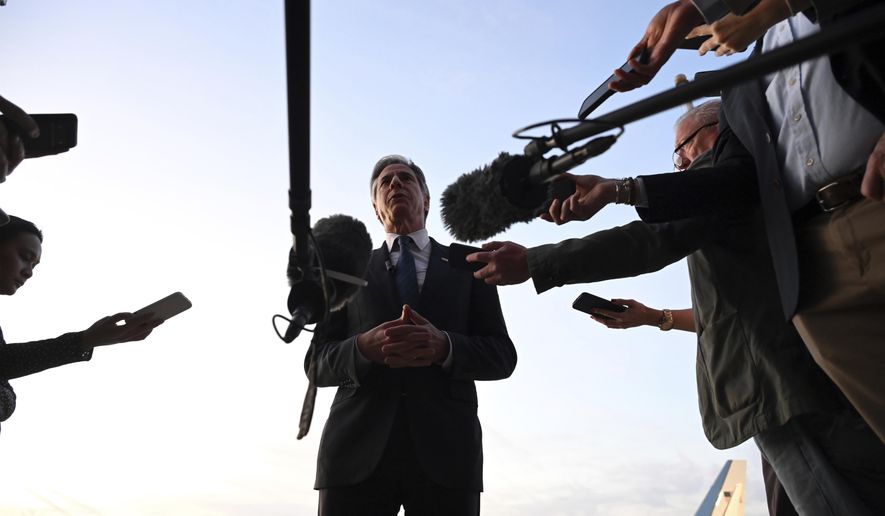AQABA, Jordan — Top U.S. officials were in the Middle East on Thursday, pushing for stability in Syria and an end to Israel’s 14-month war in the Gaza Strip in a last-ditch diplomatic push by the outgoing Biden administration before President-elect Donald Trump takes office in a few weeks.
Secretary of State Antony Blinken was in Jordan and Turkey for talks on how to ensure a peaceful transition of power in Syria following the ouster of longtime President Bashar Assad, while White House national security adviser Jake Sullivan was in Israel in a bid to nail down an elusive ceasefire with Hamas militants.
A ceasefire would give President Joe Biden a final diplomatic victory after a turbulent term in which his administration has been unable to halt a brutal war that has claimed tens of thousands of lives in Gaza and plunged the territory into a series of humanitarian crises.
Mr. Trump has demanded the immediate release of hostages held by Hamas and has urged the U.S. not to get involved in Syria, where some 900 troops are based to combat the Islamic State militant group. Despite long periods with little diplomatic movement, Mr. Biden’s aides say there may finally be some cause for hope, especially with the geopolitical earthquake that was the sudden collapse of the Syrian regime.
Speaking to reporters in Tel Aviv, Sullivan expressed cautious optimism that conditions were ripe for halting the long-running Israeli-Hamas conflict before the Biden administration leaves office.
“I wouldn’t be here now if I didn’t think this thing was just waiting until after January 20,” he said. That’s when Mr. Trump will be inaugurated.
U.S.-led ceasefire efforts have repeatedly faltered throughout the war, sparked by the murderous rampage by Hamas militants October 7, 2023 into southern Israel, with the warring sides blaming each other for the failure.
Israel has said it is seeking the destruction of Hamas’ governing and military capabilities, and at times has pressed ahead with the offensive in the face of U.S. calls for restraint. Hamas, meanwhile, has stuck to its demands that any ceasefire include a permanent end to the fighting and full withdrawal of Israeli forces from Gaza.
There were reports from the region that Hamas is now willing to allow at least some Israeli troops to remain in the Gaza enclave after a ceasefire, a long-time sticking point in the talks.
Mr. Sullivan said the rapid-fire changes across the region have improved the chances for success.
He said Israel’s ceasefire with Lebanon’s Hezbollah movement last month, ending more than a year of fighting, the collapse of Syria’s government and the heavy blow Israel has inflicted on Hamas have all changed the negotiating climate.
He also said there has been good cooperation with the incoming Trump administration, with widespread agreement between them.
“The surround sound of these negotiations is different today than it has been in the past,” Mr. Sullivan told reporters after meeting with Prime Minister Benjamin Netanyahu.
Mr. Sullivan is now scheduled to head to Qatar and Egypt — two Middle Eastern powers that have served as mediators throughout the war.
As Mr. Sullivan was in Israel, Mr. Blinken was meeting with Jordanian and Turkish leaders to push for a peaceful transition of power in post-Assad Syria.
“We’re back in the region at a time of both real promise but also peril for Syria and for its neighbors,” Mr. Blinken told reporters in Aqaba, Jordan, after meeting with King Abdullah II.
He said the U.S. was working with its partners across the region to help Syria “transition away from Assad’s brutal dictatorship” and toward a new government that isn’t dominated by any single religious or ethnic group or by an outside power or the Islamic State militant group.
Syria is home to an array of armed groups with competing interests and allies.
In northern Syria, U.S.-backed Kurdish separatists are battling to fend off fighters supported by Turkey. In the country’s center and northeast, the extremist Islamic State group maintains a presence that generates concern for the U.S. And the triumphant rebels, hailing mainly from the Sunni Muslim majority in Syria, face the daunting task of creating a transitional government for the war-ravaged country.
Israel, meanwhile, has sent troops into Syria — its northern neighbor — and seized a former buffer zone that had been demilitarized since a 1974 truce. Israel has described the move as defensive and temporary, meant to protect its border and to prevent armed groups from seizing weapons left behind by Assad’s army.
Mr. Netanyahu said Thursday Israel would remain inside Syria until another party can secure the border, raising the likelihood of a prolonged and open-ended presence.
Mr. Blinken called Thursday for restraint by all regional players with interests in Syria. He said the U.S. is “already talking to Israel” and others about the future of Syria.
“Across the board, when it comes to any actors who have real interests in Syria, it’s also really important at this time that we all try to make sure that we’re not sparking any additional conflicts,” he said.




Please read our comment policy before commenting.